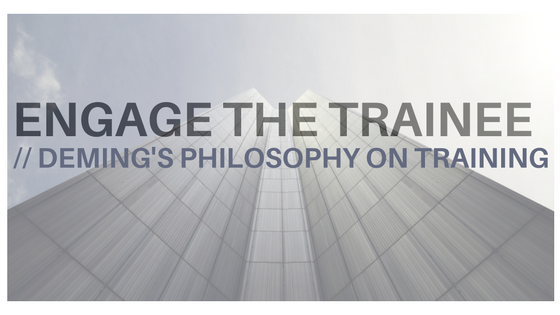For those reading that have been even mildly involved in anything “quality” are familiar with W. Edwards Deming and his famously penned “14 Points for Management”. Mr. Deming’s rich educational background and positions of influence in the U.S. government led him to Japan where he was a consultant to Japanese businesses. His message of the power of statistical methods and quality improvement was clear and he raised expectations of the management tier. His 14 points are based on the need for management to bear the responsibility for quality and quality improvement. Surprisingly two of his fourteen points are focused on training and education, one of which is:
Institute training on the job.
Deming’s view was to practice modern training methods and invest in on-the-job training for all employees. Everyone should be trained in the technical aspects of their job, and in modern quality and productivity improvement methods as well. The training should encourage all employees to practice these methods every day.
Deming was convinced that training should be a continuous, ongoing, engaging module of the business system not a one time event that occurs when a procedure changes or when a validation is being executed. (I sense the strong agreement from quality engineers and managers from all over).
We are decades past Deming’s own consultancy and teaching of the 14 points but never has his take on employing modern training methods been so critical. The 4 major age groups employed within the U.S. workforce: Boomers, Gen X, Millennials and Gen Z, branched out with various diversities and various backgrounds makes finding the correct training method to use difficult for most employers. Traditional training methods may not speak to the fast paced learning language of the millennials nor do the modern interactive methodologies engage the “show me once and I’ll learn it” learning method of the Boomers. However the modern take on “blended” training and teaching were already in the front of Deming’s philosophy where modern methods, on the job training and constant practice had to hold hands in order to engage any trainee.
The systemic approach to provide this level of superior training cannot all be discussed now however outcomes of any training is dependent on a few major pointers:
- Senior Management Support- allowing dedicated time for training. This speaks volume of support to the training program.
- Departmental Management Support- building and compiling the right resources for the training.
- Trainer- knowing the audience.
More on these topics will be discussed in the future but for now become the voice of Deming at your workplace!
